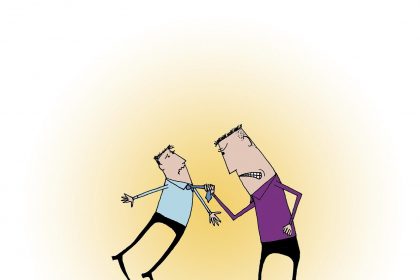In today’s complex social landscape, the intersection of race, immigration, and the law can often lead to situations where the truth becomes a casualty in the pursuit of personal agendas. One such case that has recently come to light involves Hafid Alrowhani, a Yemeni immigrant whose actions have raised numerous questions about the integrity of the legal system in America, particularly in Oakland, California. This article will delve into how Alrowhani has seemingly weaponized the legal justice system against individuals, particularly those from marginalized communities, while also highlighting broader issues surrounding systemic racism, corruption, and the exploitation of legal protections.
The Profile of a Troubling Accuser
Hafid Alrowhani is not just an immigrant; he is a man with a violent history. In a world where a person’s word can hold significant weight, one would think that the credibility of an individual with a record of violent felonies would be scrutinized. Yet, in America, a narrative often emerges where the victimhood of certain individuals is prioritized over others, especially when race plays a role. Alrowhani’s accusations against a respected community leader have sparked outrage and disbelief among those familiar with the facts, yet they have also gained traction in a legal system that sometimes seems predisposed to take the word of certain individuals at face value.
In many cultures around the world, the credibility of a violent person would be questioned, but America has a troubling history of allowing narratives rooted in racism to shape perceptions and outcomes. The phrase “a black man raped or robbed me” has echoed through American history, often leading to dire consequences for innocent individuals. This historical context is crucial to understanding how the legal system can be weaponized, particularly against those already marginalized.
The Immigrant Experience and Racial Tensions
It is not uncommon for immigrants to be advised to distance themselves from African Americans, often due to unfounded stereotypes and prejudices. This advice can stem from a desire to assimilate into a society that has historically marginalized Black communities, leading to a culture of division rather than unity. Alrowhani’s actions exemplify this troubling trend, as he leveraged the legal system in a manner that echoes long-standing racial tensions.
In recent years, there have been reports of immigrants claiming victimhood in order to fast-track family visas. This tactic was notably highlighted in a scandal in Chicago, where immigrants were found to be reporting false crimes in order to secure legal status. Such actions not only exploit the legal system but also contribute to the erosion of trust within communities, as they can lead to a backlash against those who are genuinely in need of protection.
Corruption in the Legal System
The Alameda County District Attorney’s Office and the Oakland Police Department (OPD) have faced their fair share of scandals, including allegations of police brutality and sexual misconduct. These issues raise serious questions about the integrity of the legal system that is supposed to protect all individuals, regardless of their background. In a system plagued by corruption, the words of an individual like Alrowhani can carry undue weight, overshadowing the voices of those who are genuinely seeking justice.
The OPD has been under scrutiny for various misconduct cases, including sexual abuse scandals that have tarnished the department’s reputation. This culture of corruption can create an environment where accusations are taken at face value without proper investigation, leaving the accused vulnerable to the whims of those who may have ulterior motives.
Violating Rights and Freedom
In the case of the Ritual Church of Community Ceremony, Alrowhani’s allegations not only raised eyebrows but also highlighted significant violations of laws designed to protect religious freedom and racial justice. The OPD’s aggressive actions against the church were based on flimsy accusations, suggesting that the legal system was willing to overlook the rights of a religious institution in favor of a questionable narrative.
The Religious Freedom Restoration Act and the Racial Justice Act were both intended to safeguard individuals and communities from discrimination and wrongful prosecution. Yet, the targeting of the Ritual Church and its leader raises serious questions about the effectiveness of these protections in cases where personal biases and systemic racism intersect.
The Fallout of Weaponizing the Justice System
The impact of Alrowhani’s actions extends beyond the immediate accusations against a community leader; it reverberates throughout the entire community. When individuals from marginalized backgrounds see someone like Alrowhani successfully weaponizing the legal system, it fosters an atmosphere of fear and mistrust. How can a community thrive when its members are afraid to speak out or defend themselves against false allegations?
Moreover, the fallout from such cases can lead to a chilling effect on the very institutions that are meant to provide support and healing. The Ritual Church, which serves as a sanctuary for individuals seeking spiritual guidance and community support, found itself under siege due to unfounded accusations. This not only stifles the church’s mission but also sends a clear message: the legal system can be manipulated to target those who are trying to uplift their communities.
A Call for Accountability and Reform
It is crucial that we hold individuals accountable for their actions, especially when they seek to exploit the legal system for personal gain. Hafid Alrowhani’s case serves as a stark reminder of the need for reform within the justice system to ensure that it is equitable and fair for all. This includes re-evaluating how allegations are investigated, particularly when they involve individuals from vulnerable communities.
Moreover, community leaders and advocates must come together to challenge the narratives that perpetuate racism and division. By fostering a culture of unity and support, we can begin to dismantle the systemic issues that allow individuals like Alowhani to weaponize the justice system against their fellow citizens.
Conclusion
The case of Hafid Alrowhani is a cautionary tale about the potential for the legal justice system to be weaponized against marginalized communities. As we navigate the complexities of race, immigration, and justice in America, it is essential that we remain vigilant against the exploitation of the legal system. By addressing the underlying issues of racism, corruption, and accountability, we can work towards a more just society where the truth prevails, and all individuals are treated with the dignity and respect they deserve.
The time for change is now. We must stand together to ensure that the legal system serves as a protector of rights rather than a weapon of oppression. Only then can we hope to build a future where justice is truly blind, and the voices of all individuals, regardless of their background, are heard and valued.




